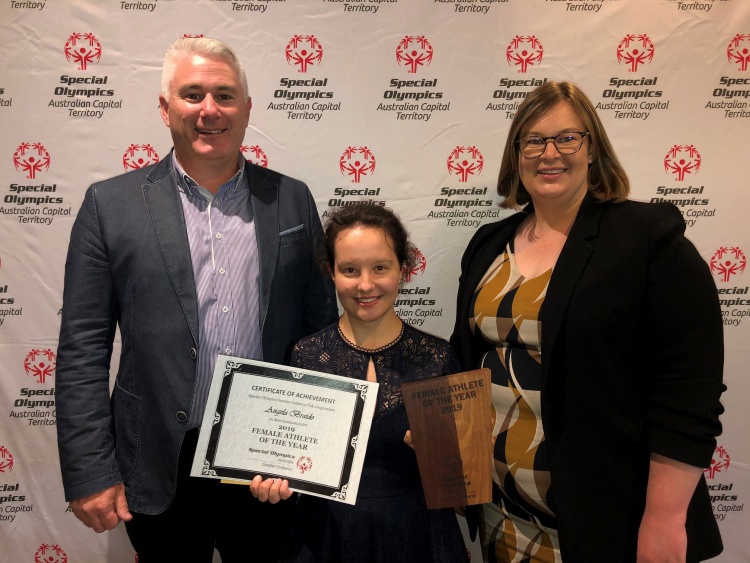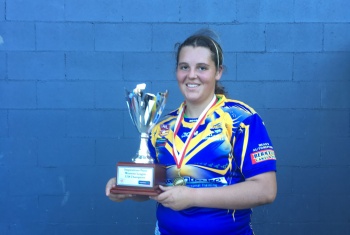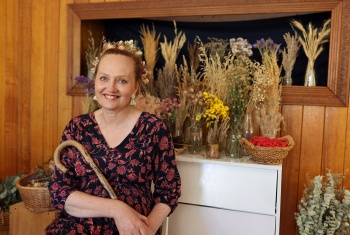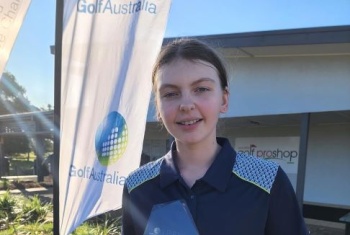Angela Braido only tried basketball for the first time four years ago. Now she’s a gold medallist, having triumphed as part of the Australian women’s team competing at last year’s Special Olympics held in Abu Dhabi during March 2019.
In recognition of her success the young woman from Canberra took out the Special Olympics Greater Canberra Female Athlete of the Year award at a gala presentation night held in the nation’s capital on 6 December 2019. The award was presented by the ACT Minister for Disability, Ms Suzanne Orr MLA.
Incredible though it may seem, Angela, who is 25, never played sport growing up. She experiences hypermobility in her joints which leaves her far more prone to injury and fatigue than most people, and also has a mild intellectual disability.
It was only when she joined the NDIS in 2016 that her sporting career took off. Her mother Agnes says that until then the family never thought it would be possible for Angela to participate in sporting activities.
“Prior to joining the NDIS Angela had some corrective surgery on both feet, which gives her better balance,” Agnes says. “So I guess without knowing it we’d taken the first step.
“Then when we had the first NDIS planning meeting Angela was talking about getting into sport as one of her goals, and our Local Area Coordinator suggested getting her some braces to help. We’d just never considered that before.”
Angela says the NDIS-funded braces for her ankles and wrists have made a huge difference to her physical capability.
“I’m now able to walk long distances, I can run, I can catch a ball properly without my wrist going right back, it’s really really helped,” she says.
Angela originally came to basketball through an NDIS-funded community activity called ‘Try a sport’, aimed at helping her engage in social activities. The sport wasn’t an obvious choice for Angela, given she stands a petite 146cm tall.
“I just loved it as soon as I tried it,” she says. “I play on the wing and I’m pretty fast, I’m good at stealing the ball.”
She was selected as the only ACT player in the NSW women’s B grade team that competed at the Special Olympics National Games in Adelaide in April 2018, and from there she was picked as one of eight players to represent Australia at the Special Olympics in her grade.
“Mum and Dad travelled over to Abu Dhabi with me but stayed separately, as I was staying with Team Australia,” Angela says. “We played lots of different countries and went through our division undefeated, then we made the knockout stage against Spain and Japan and once again were undefeated.
“We took on Spain in the grand final and it was basket for basket. We were tied at the end so we went into extra time, and in the last second of extra time one of my friends shot a three-pointer and we won.
“It was absolutely amazing!”
Angela has her sights set on wearing the green and gold again – but this time in table tennis.
“I want to try different sports and build other skills,” she says. “However, I help out my coach with the ACT Special Olympics basketball team and I’m friends with the people I started playing with.”
Angela says she gets very sore from exercise but her NDIS plan supports her with physiotherapy targeting her weaker joints, essential for her to continue playing sports.
She also works in an admin support role for the Australian Public Service three days a week and engages in community activities on the days she’s not working, with assistance from her NDIS-funded support worker Rangana.
“She’s my age and we spend a few hours together each week, going for walks and having lunch,” Angela says. “We have gone to Sydney together for a day and sometimes Rangana comes into work to support me.”
Angela is gradually becoming more independent and has NDIS transport funding so she can attend social and community activities, including two days a week at the Belconnen Community Centre where she attends the gym and sewing classes.
“Before I never used to do any socialising, but since I joined the NDIS I’ve been able to link in with other people with disabilities,” she says. “I don’t feel so different anymore.”
One day Angela hopes to move out of home, but that’s a few years’ away – right now she’s happy living at home with her parents and two sisters.



